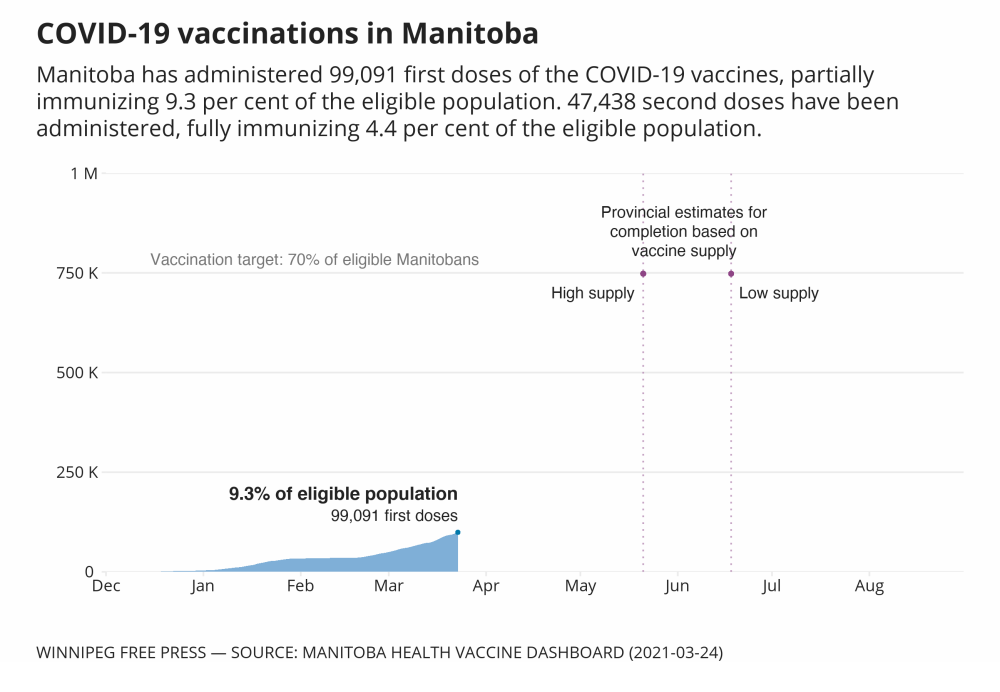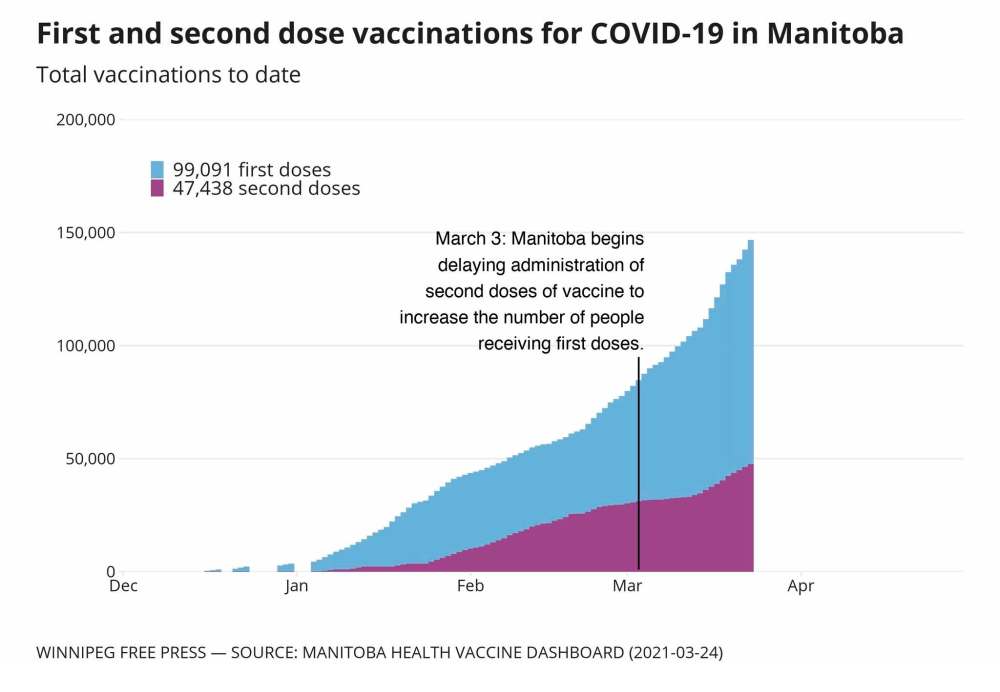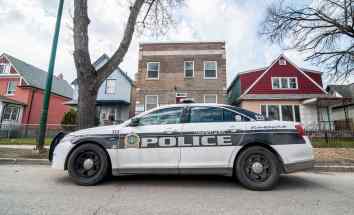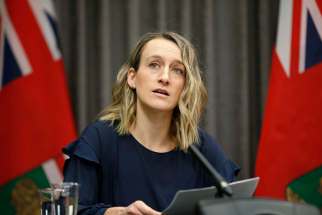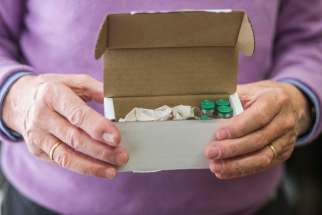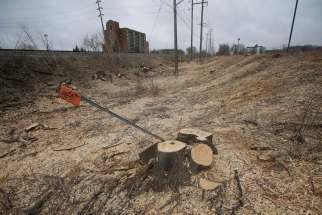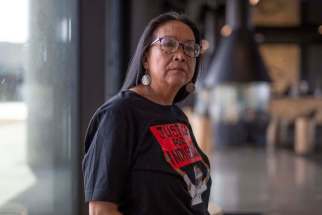Province keeping eye on single-dose infection case numbers
Read this article for free:
or
Already have an account? Log in here »
To continue reading, please subscribe:
Monthly Digital Subscription
$0 for the first 4 weeks*
- Enjoy unlimited reading on winnipegfreepress.com
- Read the E-Edition, our digital replica newspaper
- Access News Break, our award-winning app
- Play interactive puzzles
*No charge for 4 weeks then price increases to the regular rate of $19.00 plus GST every four weeks. Offer available to new and qualified returning subscribers only. Cancel any time.
Monthly Digital Subscription
$4.75/week*
- Enjoy unlimited reading on winnipegfreepress.com
- Read the E-Edition, our digital replica newspaper
- Access News Break, our award-winning app
- Play interactive puzzles
*Billed as $19 plus GST every four weeks. Cancel any time.
To continue reading, please subscribe:
Add Free Press access to your Brandon Sun subscription for only an additional
$1 for the first 4 weeks*
*Your next subscription payment will increase by $1.00 and you will be charged $16.99 plus GST for four weeks. After four weeks, your payment will increase to $23.99 plus GST every four weeks.
Read unlimited articles for free today:
or
Already have an account? Log in here »
Hey there, time traveller!
This article was published 24/03/2021 (1720 days ago), so information in it may no longer be current.
Public health officials are paying close attention to the number of people who get sick with COVID-19 following a single vaccine dose, after emerging data prompted Manitoba First Nations medical leaders to refrain from delaying the second shot.
Dr. Joss Reimer, medical lead for the provincial COVID-19 vaccine implementation task force, said her office has access to real-time data on how many infections are reported in vaccinated Manitobans.
“We are monitoring all the time for every single case that gets diagnosed in Manitoba, to determine whether or not it happened in someone who was immunized or not immunized. And that allows us to compare to the general population who has not received a vaccine, comparing it to those who have, to determine how protective that vaccine truly is,” Reimer explained during a news conference Wednesday afternoon.
“What we’re seeing so far is, particularly in personal care homes, a massive drop in the number of cases that occur after vaccines have had a chance to lead to that immune response,” she said.
“Broadly speaking, it’s been encouraging.”
On March 3, the National Advisory Committee on Immunization recommended as long as vaccines remain in short supply, required second doses should be delayed up to four months to extend single-dose coverage to more people.
Vaccine manufacturers say the doses should be given 21 and 28 days apart for Pfizer-BioNTech and Moderna, respectively.
Manitoba adopted the policy the same day, and the first people to be immunized under the new protocol began to receive their shots in mid-March.
However, the Manitoba First Nations COVID-19 Pandemic Response Coordination Team has reported, in First Nations people who received a single shot of the Moderna vaccine, more infections than would be expected were detected two to four weeks, or more, after immunization.
In response, the team has adjusted its approach to using the Moderna vaccine, and will give second doses as close as possible to the 28-day mark.
While the data set the First Nations team used to come to that decision was quite small, “We do need to act on what we know now,” it wrote in a weekly bulletin.
“Where we’re seeing a little bit of concern after one dose is in some of our First Nations communities. Where we know, due to the same reasons that they were at higher risk in the first place — whether that’s housing, poverty or just a lot of the effects of colonization — it’s possible there that that first dose is not as effective because there’s so much more exposure to the virus in those congested settings,” Reimer said.
“That first dose may not be as protective as we had hoped.”
Reimer said her office will also be monitoring results from other jurisdictions, as some other Canadian provinces started delaying second doses around the same time.
“If we saw a large drop in effectiveness, even if it was not a very large group of people, that would cause us to move faster,” Reimer said. “Whereas if it was a small difference, we would want more data before we shifted our whole strategy.
“What we’re seeing so far… is that the protection has shown to be quite effective in most of Manitoba.”
On the logistics and planning end of the vaccine rollout, the immunization campaign will face its biggest test in the next 10 days, as it ramps up to hit a total of 200,000 doses delivered by April 3.
Johanu Botha, operations and planning lead with the task force, said by early next week, as many as 8,000 doses will be delivered to Manitobans each day through the province’s immunization network.
“Over the next month, we will have many days of mid-7,000 to almost 10,000 doses administered now that we have a fairly robust supply of both Pfizer and Moderna for April,” Botha said at a briefing with reporters Wednesday morning.

“There will likely be days where we’re well over 10,000 being administered across the province,” Botha said, taking into account doses given by First Nations on reserves or at doctors clinics and pharmacies.
“It’s a good sign. It’s nice to see.”
As of Wednesday, the province had exceeded its goal to have the capacity to deliver 20,000 shots/day, if vaccine supply was robust. However, it hit its current capacity of 20,918 daily doses through additional pop-up clinic capacity.
Earlier this year, officials with the vaccine task force had planned to open 13 mass vaccination clinics throughout the province; as of Wednesday, five such clinics were in operation.
Provincial data indicated 10,000 out of the 18,000 AstraZeneca doses allocated to pharmacists and doctors throughout the province nearly two weeks ago had been administered.
Botha said he was pleased with the rate with which doctors and pharmacists were moving doses out of their door, and said all available shots should be used up before they expire.
On Wednesday, the age eligibility criteria for immunizations had not changed from 65 for members of the public and 45 for First Nations people.
The province announced appointments were once again being booked at Brandon, Thompson and Selkirk, after temporarily pausing bookings.
danielle.dasilva@freepress.mb.ca

Our newsroom depends on a growing audience of readers to power our journalism. If you are not a paid reader, please consider becoming a subscriber.
Our newsroom depends on its audience of readers to power our journalism. Thank you for your support.
History
Updated on Wednesday, March 24, 2021 6:42 PM CDT: Updates final

